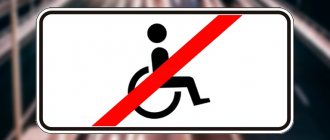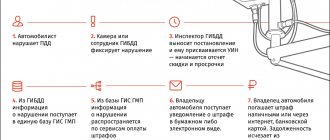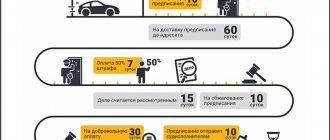Is this legal?
A vehicle (VV) is recognized as property, and therefore can be legally seized in the same way as other property. The presence of debts is a good reason for seizing property, because... compels the debtor to fulfill his obligations. During the period of its validity, the car owner loses the opportunity and right to dispose of the vehicle at his own discretion.
The fundamental document for the seizure of a car is the Law of the Russian Federation of October 2, 2007 No. 229-FZ “On Enforcement Proceedings” (as amended in 2021). In accordance with its Article 80, the arrest is carried out by a bailiff on the basis of a writ of execution, which contains a decision on recovery after the expiration of the allotted period. To carry it out, a court must recognize the owner of the car as a debtor.
In addition to depriving the owner of the right to use the vehicle, a registration arrest may be imposed. It leaves the possibility of driving a car, but excludes any re-registration (sale, donation, etc.). A ban on car registration may be imposed by:
- court;
- social protection authorities;
- credit organizations;
- investigative authorities and traffic police.
When is administrative detention and arrest used?
Detention of an individual differs significantly from arrest, including in the scope of application. According to paragraph 179 of Order of the Ministry of Internal Affairs of Russia dated August 23, 2017 N 664, administrative detention is used solely to ensure the correct and timely consideration of the case or to execute an administrative penalty in the form of arrest.
The basis for administrative detention, that is, short-term restriction of the freedom of an individual, is the need to ensure the correct and timely consideration of a case of an administrative offense, the execution of a decision in a case of an administrative offense. The detention of an individual is carried out on the grounds and in the manner established by the Federal Law “On Police”
Clause 179 of Order of the Ministry of Internal Affairs of Russia dated August 23, 2017 N 664
There are many grounds for detention and all of them are specified in Part 2 of Article 14 of Federal Law No. 3 of 02/07/2011 - Federal Law.
The police have the right to detain: 1) persons suspected of committing a crime, as well as persons against whom a preventive measure in the form of detention has been chosen, on the grounds, in the manner and for the period provided for by the criminal procedural legislation of the Russian Federation; 2) persons who escaped from custody, persons evading serving a criminal sentence, from receiving an order to be sent to the place of serving the sentence, or who did not arrive at the place of serving the sentence within the period established in the specified order, before transferring them to the relevant authorities, institutions or officials of these bodies and institutions; 3) persons evading the execution of administrative punishment in the form of administrative arrest, before they are transferred to the place of serving the administrative arrest; 4) persons on the wanted list, before their transfer to the relevant bodies, institutions or officials of these bodies and institutions; 5) persons against whom proceedings are being conducted in cases of administrative offenses, on the grounds, in the manner and for the period provided for by the legislation on administrative offenses; 6) military personnel and citizens of the Russian Federation, called up for military training, suspected of committing a crime, before their transfer to the military police of the Armed Forces of the Russian Federation, commanders of military units or military commissars; (as amended by Federal Law No. 7-FZ dated 03.02.2014) 7) persons evading the execution of compulsory medical measures or compulsory educational measures assigned to them by the court, before transferring them to institutions that ensure the execution of such measures; persons who evade going to specialized medical institutions for the execution of compulsory medical measures assigned to them by the court, on the grounds, in the manner and for the period provided for by federal law; 9) persons who violated the curfew rules, on the grounds, in the manner and for the period provided for by the federal constitutional law; 10) persons who illegally entered or attempted to enter protected facilities, until their identity is determined, but for a period of no more than three hours; 11) persons who have attempted suicide or have signs of severe mental disorder and create a danger to themselves and others through their actions, before transferring them to medical institutions or at their place of residence; 12) persons who escaped from a psychiatric hospital or are hiding from court-ordered involuntary hospitalization in such an institution, before transferring them to a psychiatric hospital; 13) persons in respect of whom a request for extradition has been received, before their transfer to a foreign state on the grounds, in the manner and for the period provided for by the legislation of the Russian Federation or an international treaty of the Russian Federation.
2) persons who escaped from custody, persons evading serving a criminal sentence, from receiving an order to be sent to the place of serving the sentence, or who did not arrive at the place of serving the sentence within the period established in the specified order, before transferring them to the relevant authorities, institutions or officials of these bodies and institutions; 3) persons evading the execution of administrative punishment in the form of administrative arrest, before they are transferred to the place of serving the administrative arrest; 4) persons on the wanted list, before their transfer to the relevant bodies, institutions or officials of these bodies and institutions; 5) persons against whom proceedings are being conducted in cases of administrative offenses, on the grounds, in the manner and for the period provided for by the legislation on administrative offenses; 6) military personnel and citizens of the Russian Federation, called up for military training, suspected of committing a crime, before their transfer to the military police of the Armed Forces of the Russian Federation, commanders of military units or military commissars; (as amended by Federal Law No. 7-FZ dated 03.02.2014) 7) persons evading the execution of compulsory medical measures or compulsory educational measures assigned to them by the court, before transferring them to institutions that ensure the execution of such measures; persons who evade going to specialized medical institutions for the execution of compulsory medical measures assigned to them by the court, on the grounds, in the manner and for the period provided for by federal law; 9) persons who violated the curfew rules, on the grounds, in the manner and for the period provided for by the federal constitutional law; 10) persons who illegally entered or attempted to enter protected facilities, until their identity is determined, but for a period of no more than three hours; 11) persons who have attempted suicide or have signs of severe mental disorder and create a danger to themselves and others through their actions, before transferring them to medical institutions or at their place of residence; 12) persons who escaped from a psychiatric hospital or are hiding from court-ordered involuntary hospitalization in such an institution, before transferring them to a psychiatric hospital; 13) persons in respect of whom a request for extradition has been received, before their transfer to a foreign state on the grounds, in the manner and for the period provided for by the legislation of the Russian Federation or an international treaty of the Russian Federation.
Part 2 of Article 14 of the Federal Law of 02/07/2011 No. 3 - Federal Law
Now let's look at the options when administrative arrest is applied.
- Part 2 of Article 12.7 of the Code of Administrative Offenses of the Russian Federation. Driving a vehicle without a driver's license. The period of arrest is up to 15 days.
- Part 3 of Article 12.8 of the Code of Administrative Offenses of the Russian Federation. Driving a vehicle while intoxicated by a driver who is deprived of a license or does not have one at all. The period of arrest is from 10 to 15 days.
- Part 2 of Article 12.26 of the Code of Administrative Offenses of the Russian Federation. Refusal of a medical examination by a driver who does not have a license or has been deprived of it. The period of arrest is from 10 to 15 days.
- Part 2 of Article 12.27 of the Code of Administrative Offenses of the Russian Federation. Leaving the scene of an accident. The period of arrest is up to 15 days.
- Part 1 of Article 20.25 of the Code of Administrative Offenses of the Russian Federation. Failure to pay a fine. Administrative arrest for failure to pay a traffic police fine is imposed for a period of up to 15 days.
The violations that we have indicated are unlikely to be committed intentionally; in other words, a person, having violated one of these instructions, consciously accepts this type of punishment.
In what cases is it possible?
The purpose of seizing a vehicle is to prevent the destruction or sale of equipment until the final resolution of the controversial situation (voluntary repayment of debt or confiscation of property by court). It may be caused by the following circumstances.
Credit car
A car, as an expensive property, often becomes collateral when taking out a large loan from a bank. In addition, banks provide special car loans for the purchase of a vehicle, and until the loan is fully repaid, the car becomes collateral. The fact that the car is pledged is necessarily reflected in the contract .
If the borrower for any reason stops fulfilling its payment obligations, the credit institution goes to court, which makes an appropriate decision to repay the debt. It is transferred to the FSSP, and at the request of the bank, bailiffs seize the pledged car.
Non-payment of alimony
In accordance with Article 113 of the RF IC, bailiffs accrue arrears in the payment of alimony . The ex-wife or guardian files an application to the court if the father evades the established payments for child support.
The court may make a decision to seize property, which is executed by bailiffs. In this case, the car can become seized property if it is not a means of transportation for a disabled person or a means of receiving official income.
Debt on traffic police fines
Often, vehicle owners ignore fine payments issued for traffic violations . As a result, a significant amount of debt can accumulate. The traffic police has the right to impose a registration ban and go to court to force the payment of fines.
In principle, the basis for arresting a vehicle is the recognition of its owner as a debtor in court for various reasons. Such a claim may be filed by the management company or organizations providing housing and communal services in case of evasion of payment of utility bills. A valid reason is failure to pay administrative fines for various offenses. Debts may arise during the division of property in court.
A demand for debt repayment can be made by any legal entity or individual who can prove its existence. In all cases, the court may decide to seize property .
We discussed in more detail all the grounds on which a car can be seized in this material.
Can a traffic police inspector detain a driver for failure to pay a fine?
It is not difficult to find out about the existence of an unfulfilled obligation. It is enough to look at the electronic database, for example, the official online service of the traffic police, which is what traffic police officers use when stopping drivers. This raises a logical question: what consequences await a driver who does not pay the fine on time?
Dear reader! Didn't receive an answer to your question? Our expert lawyers work for you. It's absolutely free!
- Moscow ext 152
- St. Petersburg ext 152
- All regions ext 132 (Toll free)
In such a situation, tougher sanctions in the form of doubling the initial fine or arrest for 15 days may become a reality for a careless motorist.
However, the driver should be aware of several nuances:
- You can pay the fine even on the very last day of the 70-day period and the traffic police officer will not be able to do anything until the expiration of the period established by law.
- If the fine is overdue, then the traffic police inspector can only draw up a protocol against the violator and transfer it to the department to initiate a case, followed by sending the materials to the court.
- Punishment for evading a fine can only be imposed by a court, and not by the traffic police inspector who stopped the driver.
Therefore, the question of whether a traffic police officer can detain someone for an unpaid fine should be answered in the negative. Only the court has such powers.
At what amount of debt can bailiffs seize a vehicle?
The law does not stipulate a limit on the minimum amount of debt at which a vehicle can be seized. However, the court must take into account the principle of proportionality, i.e. The appraised value of the car should cover debts and legal costs, but not greatly exceed them. At the same time, if there is no other property sufficient to pay off the debt, the debtor can be forced to sell the car on his own and pay the required amount.
When making a decision to seize a car, the principle of priority must also be observed. First of all, bank accounts are checked and, if necessary, they are seized. If the debtor does not have them, then the property indicated by him is taken into consideration. Luxury items follow. Only after the listed property does the turn come to the car. The above does not apply to credit and pledged vehicles.
Rights of the detainee
- The detainee has the right to a telephone call to notify relatives or close persons that he has been detained and his location. Also, upon request, the inspector can independently make the necessary call.
In this case, the call cannot be provided to the following persons:
- Those who have escaped from custody, are evading serving a criminal sentence, from receiving an order to be sent to the place of serving the sentence, or have not arrived at the place of serving the sentence within the period established in the said order;
- Those who evade execution of administrative punishment in the form of administrative arrest;
- Who are wanted;
- Those who evade the execution of compulsory medical measures or compulsory educational measures assigned to them by the court;
- Who evade going to specialized medical institutions to carry out compulsory medical measures assigned to them by the court;
- Who escaped from a psychiatric hospital or are hiding from court-ordered involuntary hospitalization in such an institution;
The detained person, as soon as possible, but no later than three hours from the moment of detention, is given the opportunity to make one telephone conversation in order to notify close relatives or close persons about his detention and location. At the request of the detained person, such notification may be made by an officer. The right to a telephone conversation is not granted and notification is not carried out in the cases specified in Part 11 of Article 14 of the Federal Law “On Police”.
Article 181 of Order of the Ministry of Internal Affairs of Russia dated August 23, 2017 N 664
You must be told about your rights and responsibilities. In addition, employees, based on the regulations, must explain the reason and grounds for detention, inform about the rights to legal assistance, to an interpreter, as well as to refuse to give any testimony.
A person detained on the grounds provided for by the Code is explained his rights and obligations established by the Code, about which a corresponding entry is made in the protocol on administrative detention. A person detained on the grounds provided for by the Federal Law “On Police” is explained the reason and grounds for detention, as well as his right to legal assistance, the right to the services of an interpreter, the right to notify close relatives or close persons about the fact of his detention, the right to refuse giving an explanation
Article 185 of Order of the Ministry of Internal Affairs of Russia dated August 23, 2017 N 664
If the detained person becomes ill, the police are obliged to take all measures to provide first aid.
The police take, if necessary, measures to provide first aid to the detained person, as well as measures to eliminate the threat to the life and health of citizens or property that arose during the arrest.
Part 12 of Article 14 of the Federal Law of 02/07/2011 No. 3 - Federal Law
And in accordance with Part 16 of this Federal Law “On the Police”, the detainee is provided with security that can eliminate the threat to life and health.
Detainees are kept in specially designated premises under guard in conditions that exclude a threat to their life and health. Conditions of detention, food standards and procedures for medical care of detained persons are determined by the Government of the Russian Federation. Before placement in specially designated premises and after the end of the period of detention, detained persons are subject to inspection, the results of which are entered into the detention protocol.
Part 16 of Article 14 of the Federal Law of 02/07/2011 No. 3 - Federal Law
That is, if you are a detained person, you should not worry that you will be thrown there to suspicious individuals and left to fend for yourself. This happened before and is still heard by many, but today everything has become much better.
Consequences
The seizure of the car should be considered as a temporary measure forcing the debtor to repay the debt. However, if the court decision is evaded, more effective measures can be taken. The most radical of them is the seizure (confiscation) of the vehicle.
Do bailiffs have the right to seize a vehicle?
The court decision specifies the period for repayment of the debt . After its completion, the FSSP service has the right to seize the seized vehicle. With the participation of witnesses, a seizure report with an inventory is drawn up. The debtor is given 5 days to pay debts or appeal the action, and then the vehicle is transferred to the creditor bank or the Federal Property Management Agency for sale through an auction or in another manner prescribed by law. The difference between the debts and the cost of the car is returned to its owner.
Maximum period of administrative detention
The terms of administrative detention, on the basis of Part 4 of Article 14 of the Federal Law of 02/07/2011 No. 3 - FZ, are calculated in accordance with Article 27.5 of the Code of Administrative Offenses of the Russian Federation.
When committing an administrative offense, the period of detention should not exceed 3 hours.
The period of administrative detention should not exceed three hours, except for the cases provided for in parts 2 and 3 of this article.
Part 1 of Article 27.5 of the Code of Administrative Offenses of the Russian Federation
But there are exceptions here. For example, if the violation was committed in internal or territorial waters. In this case, the period of detention will be 48 hours.
A person against whom proceedings are underway for an administrative offense encroaching on the established regime of the State Border of the Russian Federation and the procedure for staying on the territory of the Russian Federation, an administrative offense committed in internal sea waters, in the territorial sea, on the continental shelf, in exclusive economic zone of the Russian Federation, or a violation of customs rules, if necessary to establish an identity or to clarify the circumstances of an administrative offense, may be subject to administrative detention for a period of no more than 48 hours.
Part 2 of Article 27.5 of the Code of Administrative Offenses of the Russian Federation
But that's not all. A person who has committed an administrative offense that entails administrative arrest may be detained for a period of 48 hours.
A person against whom proceedings are being conducted for an administrative offense that entails administrative arrest as one of the administrative penalties may be subjected to administrative detention for a period of no more than 48 hours.
Part 3 of Article 27.5 of the Code of Administrative Offenses of the Russian Federation
The period of detention begins from the moment the individual is delivered in accordance with the law, and if the person is intoxicated, then from the moment he sobers up.
The period of administrative detention of a person is calculated from the moment of delivery in accordance with Article 27.2 of this Code, and of a person in a state of intoxication, from the time of his sobering up.
Part 4 of Article 27.5 of the Code of Administrative Offenses of the Russian Federation
The maximum period of administrative arrest, since it is a punishment, is much longer and, as a rule, is no more than 15 days.
Administrative arrest consists of keeping the violator in conditions of isolation from society and is established for a period of up to fifteen days, and for violating the established procedure for organizing or holding a meeting, meeting, demonstration, procession or picketing or organizing a mass simultaneous stay or movement of citizens in public that entailed a violation of public order places, for violation of the requirements of a state of emergency or the legal regime of a counter-terrorism operation, or for committing administrative offenses in the field of legislation on narcotic drugs, psychotropic substances and their precursors for up to thirty days. Administrative arrest is ordered by a judge. (as amended by Federal Laws dated July 27, 2006 N 153-FZ, dated November 25, 2013 N 313-FZ, dated July 21, 2014 N 258-FZ)
Part 1 of Article 3.9 of the Code of Administrative Offenses of the Russian Federation
But, as can be seen above, arrest for up to 30 days is still imposed for some violations.
The period of detention is included in the period of arrest.
The period of administrative detention is included in the period of administrative arrest.
Part 3 of Article 3.9 of the Code of Administrative Offenses of the Russian Federation
What to do if your car is seized?
The arrest can only be lifted upon completion of enforcement proceedings under the following conditions:
- fulfillment by the debtor of all his obligations, repayment of debt;
- initiative of the applicant (plaintiff) in reaching a compromise solution;
- court decision on the unlawfulness of the arrest;
- termination of proceedings by court decision.
The procedure for the vehicle owner depends on the reasons for the arrest . First of all, you should find out them. To do this, you can use the traffic police and FSSP database by going to the official website (read here how you can check whether a car has been seized). If the arrest is made in full compliance with the law, then it is best to find funds and pay off the debt.
After this, you must submit a document confirming payment to the bailiffs. After an appropriate check, they will lift the arrest within 24 hours. To terminate registration restrictions, you must submit an application to the traffic police, attaching the bailiff's decision and payment documents.
Another option is a peace agreement with the creditor . If it is possible to agree on a change in the timing of payments, the plaintiff must withdraw his application from the court. The judge will make an appropriate decision to terminate the enforcement proceedings. Please note that the registration restriction may be maintained until the debt is fully repaid.
Finally, in case of violations committed during the seizure of the vehicle, or a controversial situation arises, you can appeal to a higher court. This will require strong evidence that you are right. Until a new decision is made, the process of arrest and seizure may be stopped.
We tell you more about what to do if your car is seized and how to lift the restriction here.
How and why to check for fines?
As you know, notification of a fine can be made in two ways:
- Directly by the traffic police officer who recorded the violation.
- By email or registered letter , if the violation was recorded using photo and video devices.
If in the first option a person is immediately aware of the presence of a fine, then in the second, for various reasons, he may not find out. Since disqualification does not relieve the culprit of responsibility, a small fine can turn into a rather impressive amount.
To prevent this situation from worsening, it is recommended to check your car for existing fines once every two months.
You can check your car for fines and arrests as follows:
Make a request to the bailiff service at the place where the car is registered.- Contact the traffic police with a request for fines.
- Using the online service of the State Traffic Inspectorate. To check a car at this service, you must keep the vehicle's body number.
When purchasing a car, it is also recommended to check the car for fines and arrests.
It is also recommended to check using all of the above methods, since one of them may lack reliable data, which may be due to untimely updating of the database.
The deadlines for paying a fine have been increased, but the minimum amounts have also increased. In 2015, amendments were made to the Code of Administrative Offenses of the Russian Federation regarding the period allotted for paying a fine to the traffic police. Now the period for paying the fine is 60 days (previously it was 30). The countdown for paying the fine begins after the expiration of the 10 days allotted for appealing the decision on the fine in court.
Payment of the fine in installments can be made in two ways:
- Deferment of fine. Provided to the offender for a period of one month.
- Installment of the fine. Provided to the offender for a period of up to three months.
In order to take advantage of the opportunity to pay the fine in installments, you must write an application and present a certificate of income from your place of work. The appointment of a grace period for the payment of a fine is made by the court or representatives of the traffic police.
At the end of the grace period for paying the fine, the sixty-day countdown begins. During this period, the fine must be paid.
Is it possible to defer or pay in installments for traffic fines?
A citizen who realizes that due to financial difficulties will not be able to repay the debt within the time limits established by law should think about this in advance. It is important to understand that those who do not pay the fine on time will have to pay an even larger amount over time. For this reason, you should not delay until the expiration of the period allotted for voluntary payment of the debt. It is better to immediately contact the traffic police department closest to your place of residence or a judge who must issue a ruling after assigning a fine. If you provide copies of documents confirming the difficult financial situation of the debtor, you can obtain a deferment of 3 months - this is the maximum period.
How to check a fine online
A number of services have been created for drivers, the use of which will allow them to identify the debt and pay the traffic police fine on time. To use most of them you don’t even need to leave your home; everything can be done using a bank card or e-wallet. This approach has one more advantage - people who pay traffic fines remotely do not overpay due to the absence of commissions. Some services also offer additional discounts and promotions.
State Services website
You need to go to the website gosuslugi.ru and go through authorization or registration. In the latter case, you will need your SNILS number. Next, select the “Payment” section and go to the “Auto Fines” tab. Then you need to fill out an application, indicating the details of your driver’s license and vehicle registration certificate. The system will collect and display all information on fines and offer several options for repaying them. In your personal account, you can view paid debts and, if necessary, download, send or print receipts.
Traffic police website
You need to go to the traffic police website.rf, select the “Services” section in the horizontal menu, and in the cascade that opens, go to the “Checking fines” tab. When a special form appears, you should enter the data of the state registration plate of the vehicle and STS into it. If necessary, you can even check a car with a foreign license plate in this way. If the system asks you to enter a captcha to protect against robots, you need to enter the characters and activate the “Request” button. The result will be information on current and overdue fines with payment deadlines.
Official Yandex service
A convenient option for owners of an electronic wallet on Yandex. To use the service, you must go through authorization and select the “Payment for services” section in the side menu. A page with popular services will appear, on which you should go to the “Fines” tab. To fill out the form that opens, you will need to enter your driver’s license and vehicle registration information. Here you can not only pay the debt, but also check the “Receive notifications of fines” box. This will allow you not to miss information about a new administrative penalty.
Website of the Federal Bailiff Service (FSSP)
Directly on the official website of the bailiffs you can obtain information about debts that have already become overdue. To do this, you need to go to fssprus.ru, select the “Services” section and go to the “Data Bank of Enforcement Proceedings” tab. A new page will open with a form that must be filled out as per the requirements. The search can be conducted by individuals or legal entities, individual entrepreneurs, number of enforcement proceedings. Directly on the website you can choose a payment method for your debt and pay it off.










